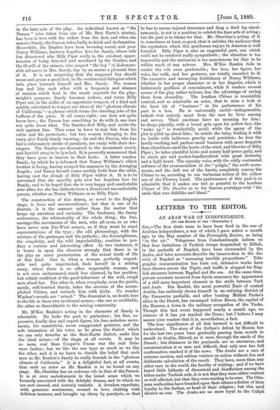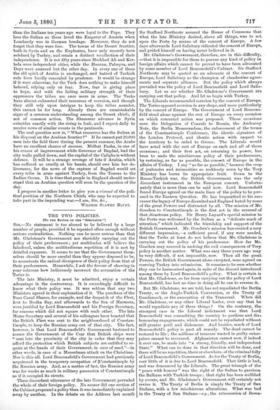LETTERS TO THE EDITOR.
AN ARAB WAR OF INDEPENDENCE.
[TO THR EDITOR OF THR SPECTATOR:1
Sin,—The first shots seem to have been fired. in the war of Arabian independence, a war of which I gave notice a month ago, in the May number of the Fortnightly Beview, as being "in the air." Telegrams from Constantinople inform us that four battalions of Turkish troops despatched to Hillah, in the pa,shalik of Bagdad, have been surrounded by the Arabs, and later accounts describe the insurrection in the dis- trict of Bagdad as "assuming terrible proportions." Tele- graphic communication has been cut, defensive works have been thrown across the Tigris, and traffic is stopped for Eng- lish steamers between Bagdad and the sea. At the same time, private accounts received from Syria announce the appearance of a still more important element in the strife between Turk and Arab. Ibn Rashid, the most powerful Emir of central Arabia, has suddenly shown himself in an outlying district of the Damascus pashalik, and after beating Midhat Pasha's allies in the Desert, has encamped before Bozra, the capital of the Hauran, a town in the military occupation of the Turks. Though this last event happened nearly a month ago, no rumour of it has yet reached the Press; but I believe I may assure your readers that it is, nevertheless, a fact.
The true significance of all this turmoil is not difficult to understand. The story of the Sultan's defeat by Russia has for the last two years been gradually passing from mouth to mouth in Arabia, filtered, as it were, through the sands of the Desert ; but distances in the peninsula are so enormous, and communication is so rare and difficult, that only now has full confirmation reached it of the news. The Arabs are a race of extreme caution, and seldom venture on action without due and deliberate calculation of the result. They have, more than any other race in the world, the faculty of waiting; and if we have heard little hitherto of discontent and disaffection among the tribes under Turkish rule, it is not that they were either content or well affected, but that they were waiting to be sure. The Otto- man authorities have founded upon their silence a fiction of their loyalty to the Sultan, as head of their religion; but this need deceive no one. The Arabs are no more loyal to the Caliph
than the Italians ten years ago were loyal to the Pope. They love the Sultan as these loved the Emperor of Austria when Lombardy was in German bondage. Moreover, they do not forget that they were free. The towns of the Desert frontier, both in Syria and on the Euphrates, have only recently been :subdued by Turkey, and retain a distinct recollection of their independence. It is not fifty years since Meshhed Ali and Ker- bele were independent cities, while the Hauran, Palmyra, and Deyr were annexed but the other day. In every one of these the old spirit of Arabia is unchanged, and hatred of Turkish rule lives hardly concealed by prudence. It would be strange if it were otherwise, for the Turk does nothing to make himself beloved, relying only on fear. Now, fear is giving place to hope, and with the failing military strength of their oppressors the tribes are once more in arms. The Turks have almost exhausted their resources of coercion, and though they still rely upon intrigue to keep the tribes asunder, this cannot be for long. Already there are unmistakable siigns of a common understanding among the Desert chiefs, if not of common action. The Sharamar advance in Syria 'coincides exactly with the rising in Irak, and I expect daily to receive news of similar events in the peninsula.
The real question now is, "What resources has the Sultan at his disposal on the Arabian frontier!"' If he cannot put 20,000 men into the field there during the present summer, the Arabs have an excellent chance of success. Midhat Pasha, in one of his crazes of improvement while Governor of Bagdad, had the -city walls pulled down, and the capital of the Caliphs is without defence. It will be a strange revenge of fate if Arabia, which has suffered so cruelly at his hands, should owe him her de- liverance, for the news of the capture of Bagdad would set -every tribe in arms against Turkey, from the Taurus to the Indian Ocean. It is time that people in England should under- stand that an Arabian question will soon be the question of the -day.
I propose in another letter to give you a rjsuazg of the poli- tical position of the Northern Chiefs who may be expected to take part in the impending war.—I am, Sir, &c.,
WILFRID SCAWEN BLUNT.



































 Previous page
Previous page